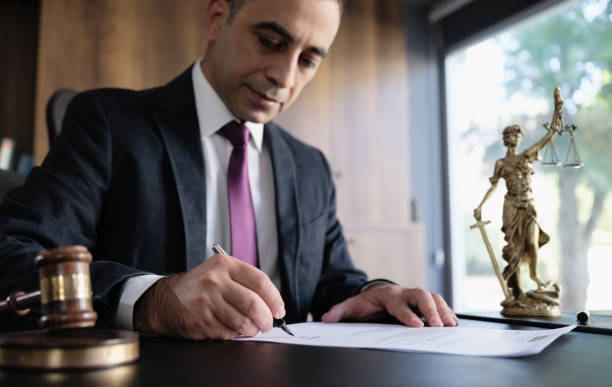What to Expect at Probate Court in Brisbane

Navigating the probate court process in Brisbane can be a daunting experience, especially during a time of grief. Understanding what to expect can help alleviate some of the stress and ensure that you are well-prepared for the proceedings. This article outlines the key aspects of probate court in Brisbane, what to expect during the process, and how probate lawyers can assist you.
The Role of Probate Court
The probate court in Brisbane oversees the administration of a deceased person’s estate. Its primary roles include:
- Validating the Will: The court confirms the authenticity of the deceased's will and ensures it was created without undue influence.
- Appointing an Executor: If not already named in the will, the court appoints an executor to manage the estate.
- Supervising Estate Administration: The court supervises the process of settling the estate, including the payment of debts and distribution of assets to beneficiaries.
- Resolving Disputes: The court addresses any disputes that may arise during the probate process, such as will contests or claims by creditors.
Steps Involved in the Probate Court Process
- Filing the Probate Petition
The first step is to file a probate petition with the Supreme Court of Queensland. This petition requests the court to validate the will and appoint the executor. The petition must include the original will, a death certificate, and other necessary documents.
- Notification of Interested Parties
Once the petition is filed, the executor must notify all interested parties, including beneficiaries and creditors, of the probate proceedings. This notification ensures transparency and allows any objections to be raised.
- Validation of the Will
The court will review the will to ensure it is legally valid. This involves verifying the authenticity of the will and confirming that it was created without undue influence or coercion. If the court is satisfied, it will issue a grant of probate, formally recognizing the will and authorizing the executor to administer the estate.
- Inventory and Appraisal of Assets
The executor, often with the assistance of a probate lawyer, must prepare an inventory of the deceased's assets and have them appraised. This step is crucial for determining the estate's value and ensuring that all assets are accounted for.
- Paying Debts and Taxes
Before distributing assets to beneficiaries, the executor must settle any outstanding debts and taxes owed by the estate. This includes funeral expenses, administration costs, and any other debts the deceased had at the time of death.
- Distribution of Assets
After all debts and taxes are paid, the remaining assets are distributed to the beneficiaries according to the terms of the will. The probate court oversees this distribution to ensure it is conducted fairly and in compliance with the law.
- Closing the Estate
Once all assets are distributed, the executor must file a final accounting with the court, detailing how the estate was managed. If the court is satisfied, it will formally close the estate, completing the probate process.
Common Issues Addressed in Probate Court
- Will Contests
Disputes over the validity of the will can arise, often involving claims of undue influence, fraud, or lack of testamentary capacity. The court will hear these disputes and determine the validity of the will.
- Claims by Creditors
Creditors may file claims against the estate for debts owed by the deceased. The court will review these claims and ensure they are settled appropriately.
- Beneficiary Disputes
Disagreements among beneficiaries regarding the distribution of assets can lead to disputes. The court will mediate these disputes and ensure that the estate is distributed according to the will.
- Executor Misconduct
If the executor is accused of mismanaging the estate or failing to fulfill their duties, the court may intervene to resolve the issue and, if necessary, appoint a new executor.
How Probate Lawyers Can Assist
Probate lawyers play a vital role in guiding executors and beneficiaries through the probate court process. Their responsibilities include:
- Providing Legal Advice
Probate lawyers offer expert advice on the legal requirements and procedures involved in probate, helping clients understand their rights and obligations.
- Preparing and Filing Documents
They handle the preparation and filing of necessary legal documents, ensuring they are completed accurately and submitted on time.
- Court Representation
In cases where disputes arise or court appearances are necessary, probate lawyers represent the estate in court, handling will contests, creditor claims, and other legal challenges.
- Asset Management
Probate lawyers assist in identifying, valuing, and managing the deceased's assets, ensuring that all assets are accounted for and appropriately handled throughout the probate process.
- Debt Settlement
They ensure that all legitimate debts and taxes are paid before distributing assets to beneficiaries, preserving the estate's value.
Why Choose QLD Estate Lawyers?
At QLD Estate Lawyers, our team of experienced probate lawyers is dedicated to providing professional and compassionate legal services. We understand the challenges you face and strive to offer clear guidance and support throughout the probate court process. For more information on how we can assist you, visit our website at QLD Estate Lawyers (https://qldestatelawyers.com.au/probate-lawyers/).
Conclusion
Understanding what to expect at probate court in Brisbane can help you navigate the process with confidence. By seeking the assistance of experienced probate lawyers, you can ensure that the probate process is conducted smoothly and in compliance with legal requirements. Whether you are an executor needing guidance or a beneficiary seeking to understand your rights, probate lawyers provide the necessary support to manage the estate effectively and fairly.